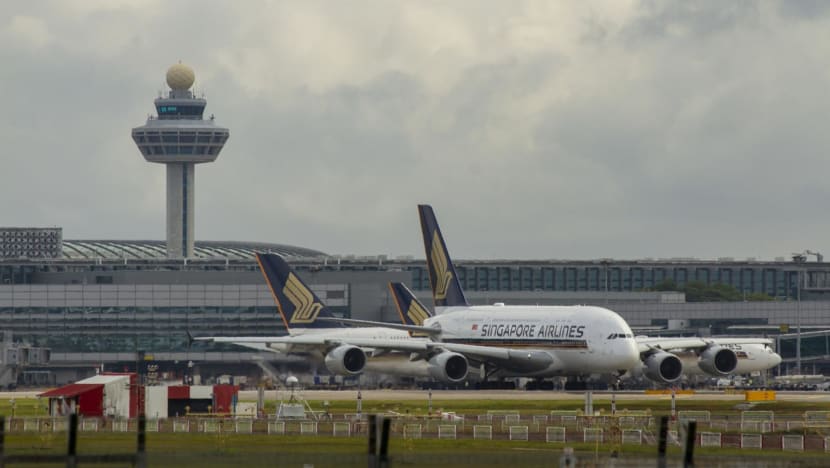Air ticket prices to go up as Singapore mandates sustainable fuel for departing flights from 2026

Singapore Airlines planes at Changi Airport in February 2020. (File photo: iStock)
SINGAPORE: Flights departing from Singapore will be required to use sustainable aviation fuel from 2026, in a move aimed at progressively decarbonising airline operations.
Passengers flying from Singapore can expect to pay more for their air tickets due to a levy imposed on the purchase of the fuel - with the exact fee depending on factors such as distance travelled and class of travel.
The initiative is part of Singapore's sustainable air hub blueprint, which was developed by the Civil Aviation Authority of Singapore (CAAS). It was launched on Monday (Feb 19) by Transport Minister Chee Hong Tat at the Changi Aviation Summit.
For starters, Singapore will aim for a 1 per cent sustainable aviation fuel uplift target in 2026.
The cost impact of this target is “manageable”, said Mr Chee, noting that key stakeholders were consulted.
“This will provide an important demand signal to fuel producers and give them the incentive to invest in new (sustainable aviation fuel) production facilities. Without an increase in supply, we will not be able to scale up the adoption of (sustainable aviation fuel) in the years ahead.”
This goal will then be raised to between 3 and 5 per cent by 2030, subject to “global developments and the wider availability and adoption” of sustainable aviation fuel in the next few years, added Mr Chee.
The eventual target decided upon beyond 2026 “will aim to strike a balance between economic competitiveness and environmental sustainability, to achieve our objective of having sustainable growth”.
To achieve the 1 per cent uplift target in 2026, the authority will introduce a levy which could increase ticket prices for an economy class passenger on a direct flight from Singapore to Bangkok, Tokyo and London by around S$3 (US$2), S$6, and S$16 respectively.
Passengers in premium classes will pay higher levies.
CAAS will continue consulting stakeholders, and will announce more details in 2025 nearer the date of implementation.
Under the blueprint, CAAS will work on rolling out several initiatives across three domains - airport, airline and air traffic management - to reach Singapore's goals.
This includes reducing domestic aviation emissions from airport operations by "20 per cent from 2019 levels in 2030". The emissions targets exclude Changi East developments, including Terminal 5, as they are not yet operational today.
Singapore also aims to achieve net zero domestic and international aviation emissions by 2050 - including emissions from international flights operated by Singapore-based operators.
The adoption of sustainable aviation fuel falls under the airline domain in the blueprint.
SUSTAINABLE AVIATION FUEL "CRITICAL" TO ACHIEVE DECARBONISATION
Sustainable aviation fuel is a form of fuel made from various feedstock or sources, including waste oil and fats, green and municipal waste and non-food crops. It can also be produced synthetically via a process that captures carbon directly from the air.
The use of such fuel is a "critical pathway" for the decarbonisation of aviation, said CAAS.
It can reduce carbon emissions by up to 80 per cent per lifecycle compared with conventional fossil jet fuel. It is expected to contribute around 65 per cent of the carbon emission reduction needed to achieve net zero by 2050.
However, adoption of sustainable aviation fuel "remains low with significant hurdles in terms of higher costs" compared with conventional jet fuel, stated CAAS in the blueprint.
It is currently priced about three to five times more than conventional fuel, and there is a need to "manage the impact of sustainable aviation fuel adoption on the cost of air travel".
Mr Chee pointed out that “it will hurt our air hub and our economy, and raise the cost of travel for passengers”, if Singapore is “overly ambitious” with sustainability goals.
“We need to balance sustainability and competitiveness to support the long-term growth of our air hub in the coming decades, while reducing carbon emissions and creating the conditions for our journey towards net zero by 2050,” he said.
DETERMINING THE LEVY
The market for the supply of sustainable aviation fuel is "still nascent" and the price of the fuel can be volatile.
As such, CAAS will adopt a "fixed cost envelope approach" to provide "cost certainty" for airlines and travellers, the authority said.
This means the levy will be set at a "fixed quantum", based on the sustainable aviation fuel target and projected price at that point in time.
Using the 1 per cent target in 2026 an an example, the levy will be set based on the volume of sustainable aviation fuel needed to achieve the target and the projected price of the fuel that year.
The amount collected through the levy will then be used to purchase the fuel, "based on the actual price of (the fuel) at the time of purchase", said CAAS.
The levy will not change - even if the actual price of the sustainable aviation fuel differs from what is projected, noted the authority.
Instead, the actual uplift volume of the sustainable aviation fuel will be adjusted based on its pre-determined levy and prevailing price.
Commercial flights today can fly with a 50-50 blend of sustainable aviation and fossil jet fuel - but the industry is working towards permitting commercial aircraft to fly with 100 per cent sustainable aviation fuel by 2030.
CAAS conducted a 20-month trial beginning in February 2022 at Changi Airport, where sustainable fuel was first uplifted onto departing Singapore Airlines and Scoot flights in July that year. Sustainable aviation fuel credits were also launched for corporate and individual travellers.
The trial found that adoption of sustainable aviation fuel "cannot depend on voluntary use alone" due to its high cost, stated CAAS in the blueprint.
"The current global supply of sustainable aviation fuel is less than 1 per cent of global jet fuel demand. Capacity will need to increase exponentially to meet the demand in 2050, so that the aviation sector can achieve its net zero goal," it added.
"It is critical that we provide fuel producers with a demand signal to give them the confidence to make further investments in sustainable aviation fuel production and accelerate global sustainable aviation fuel production."
Source: CNA/gy(sn)


No comments
Share your thoughts! Tell us your name and class for a gift (: